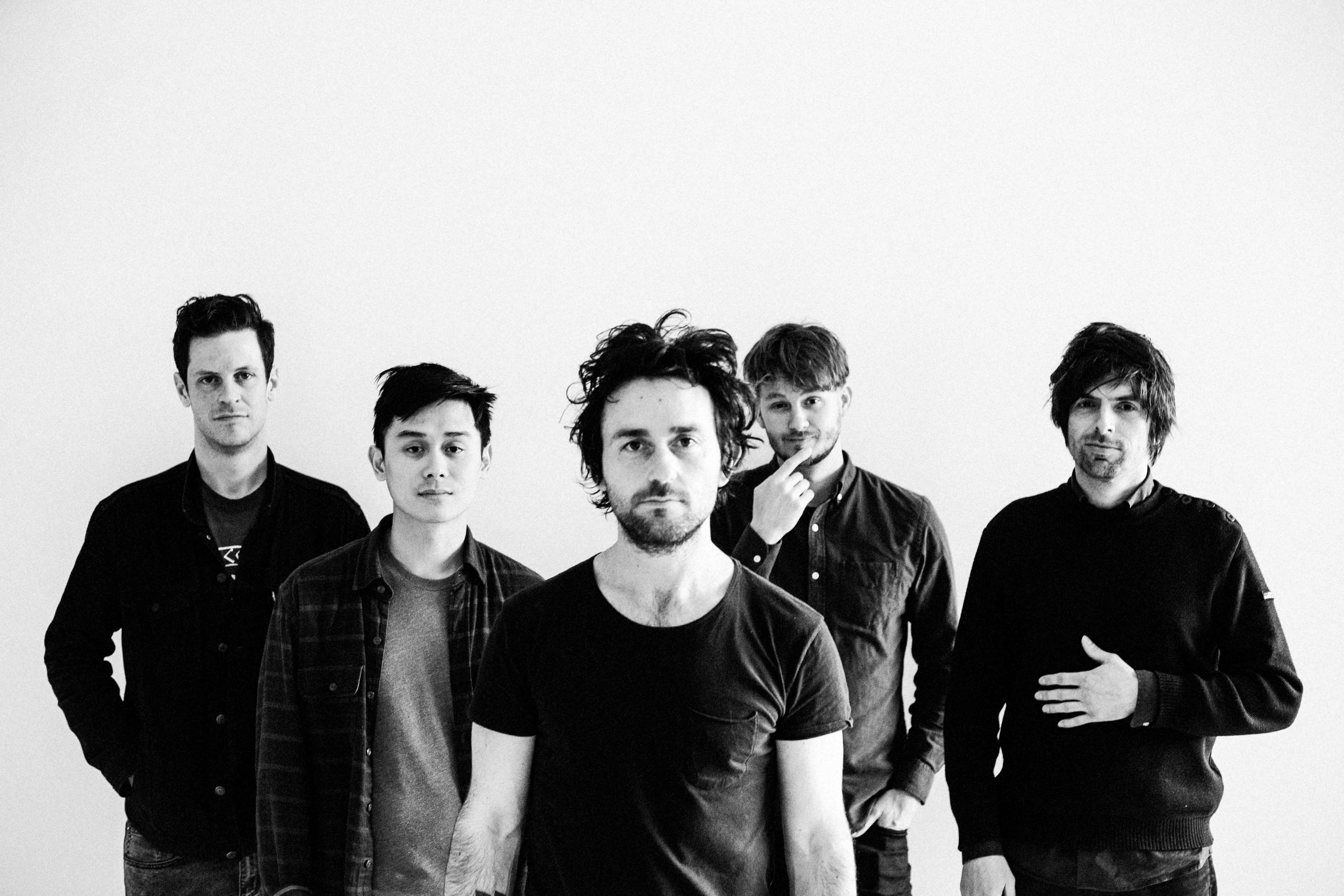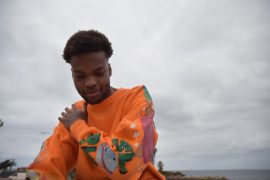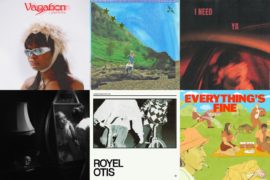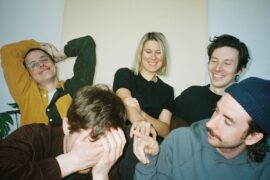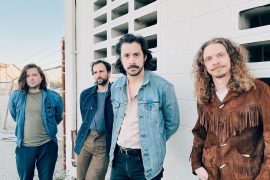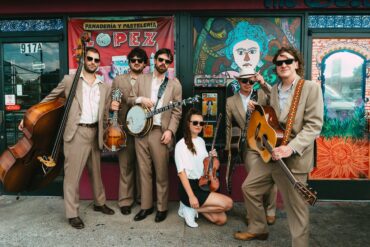Ethan Gruska speaks to Atwood Magazine about his gorgeous new album ‘En Garde’, life in quarantine, and the unexplainable.
Stream: ‘En Garde’ – Ethan Gruska
There’s no time limit on inspiration.
Sometimes, you hear a song, see a film, or look at a piece of art, and walk away with an unnameable but potent emotion. Some might say this is a bug rather than a feature, the kind of thing some inscrutable piece of contemporary art might garner. But when you feel it, you know it. This is what musician Ethan Gruska hopes to achieve (and has) with his music. The grandson of legendary film composer John Williams (Star Wars, Harry Potter, Indiana Jones) and son of Emmy-winning composer Jay Gruska, Gruska has grown up surrounded by music. He is a singer, multi-instrumentalist, and producer, with production credits from the likes of Phoebe Bridgers, Kimbra, and many more.
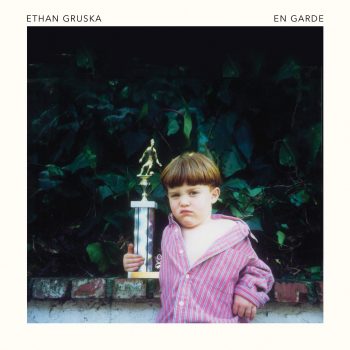
Gruska’s music inhabits something of an alternate universe, one that feels simultaneously underwater and above the clouds. His latest album, En Garde (out January 24 via Warner Records), is a universe in miniature, one of quiet streets, drunk phone calls, fireflies, rain – pianos are muted, guitars are filtered, and Gruska’s quiet tenor pulls and aches. It’s the work of a musician who has only just begun to show the world what he’s capable of.
When you come away from it, you might not be able to name the experience, but you’ll find it all the same, nestled deep in your heart.
Atwood Magazine spoke to Ethan Gruska about En Garde, life in quarantine, and the unexplainable.
I think opening up the universe of collaboration on this record was a really huge thing for me. It felt like it was more of a community, and I just felt a lot more love and support during and after.
In another light, I’m stuck to another life,
Skip over to the other line, way up front,
In another car, maybe living on another shore,
Something different that I’m living for,
Or someone,
Cover to cover, never satisfied,
I’m going under, I wanna go
home or never look back
Maybe I’ll try, maybe I’ll die trying,
To let this be enough for now,
For now, enough,
Maybe I’ll try, maybe I’ll die trying,
To let this be enough,
For now, I won’t wish for better luck
— —
:: stream/purchase En Garde here ::
A CONVERSATION WITH ETHAN GRUSKA
Atwood Magazine: First off, how are you staying sane in quarantine?
Gruska: Yeah, it’s crazy. I’m definitely somehow keeping myself busy. I’m really lucky, I have a studio at my house. Honestly, my life is sort of quarantine even when it’s not like this. I spend so much time alone doing what I’m doing now. But it’s definitely different not having any contact. I’m waking up every day in a different headspace, and it all feels pretty extreme, but the only way that I’ve been able to sort of stay level headed is to just be making a lot of stuff. I’ve just been working on new music and writing a lot, and also being with my wife. She’s actually an ICU nurse, so I’m able to see and hear a lot from her about what’s happening at the hospital, and that’s equally as comforting as it is stressful. But keeping busy and then living vicariously through her because she’s actually doing important stuff.
I know you have somewhat of a classical background, what with being the son and grandson of composers, and there are so many other genres present in your sound. How do you choose to balance these within your music?
Gruska: Weirdly, I spend most of my time going, “Oh my god, this is so unbalanced.” It’s just because my music taste is pretty all over the place. I really like classical music, music from all over the world, jazz, pop, old country, so I feel like I am sort of making a stew. Usually when I’m working on a project, the first 80% of it I’m like, “God, there’s no way this is all gonna fit together,” because there’s just too much information. Probably a combination of the fact that I’m doing it all and that sort of seams things together, but also I start sort of retracting and towards the end of the process, if there’s too much paint on it, I’m usually stripping away to try to find some sort of center, so hopefully a combination of those two things.
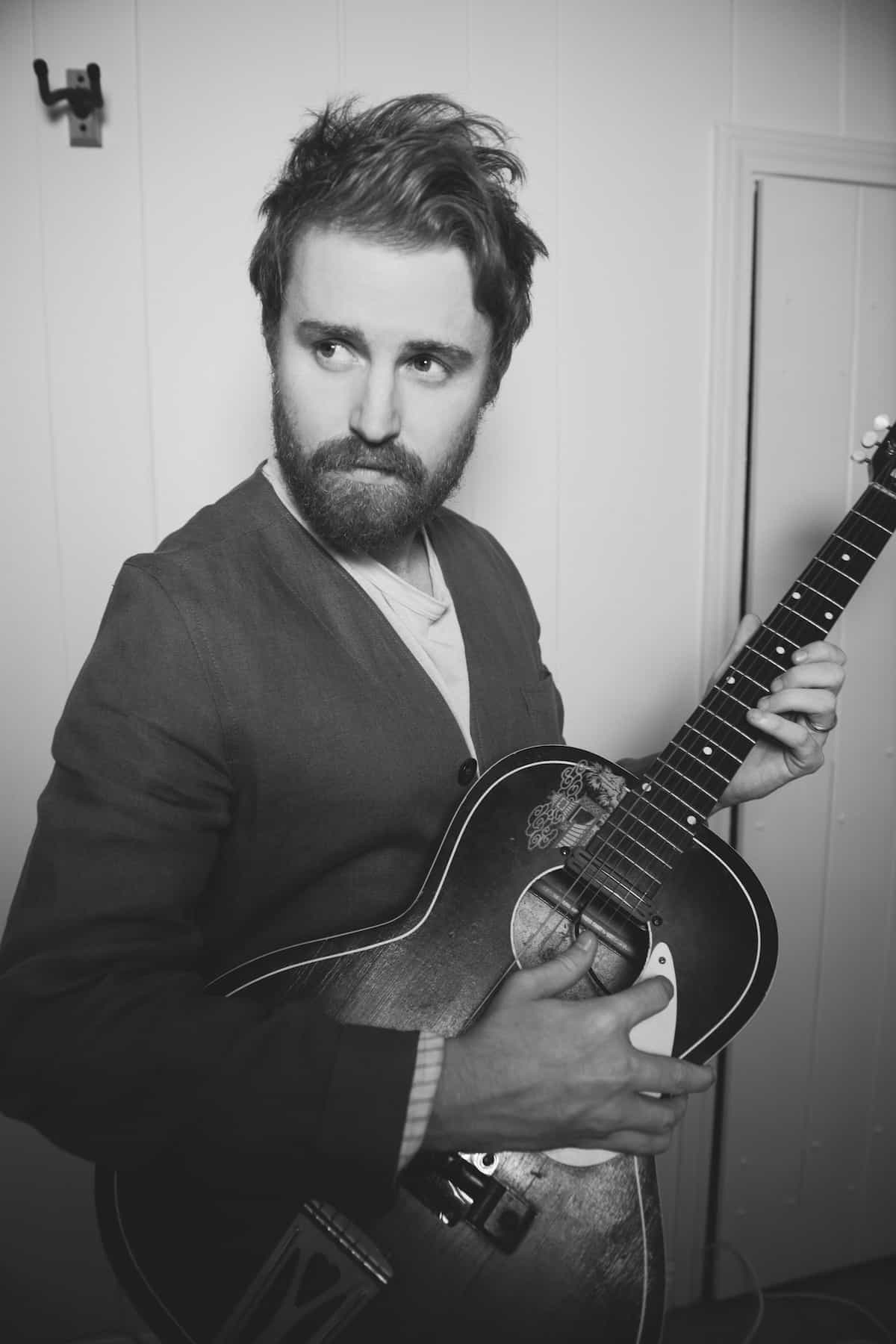
When you’re writing albums, is there often a central thesis that you’re working towards?
Gruska: The first album I made, Slowmotionary, totally has a mission statement. En Garde, this most recent one, is pretty all over the place. It didn’t have a mission statement at all and that actually freaked me out for a while. It’s like shooting in the dark a little bit. But then it became really liberating, because I felt like I could just expand as much as I wanted to with no restrictions. I think if you start with a mission statement, you should try to break free from it as much as possible, and if you start without one, you should try to hone in on one as much as possible.
Do you think you wound up with one for En Garde?
Gruska: I think that the main thing from my perspective, which is probably a pretty warped one, is that it was an album about production for me. I just spent so much time and so much thought trying to experiment to find different ways to dress up a song. Obviously, I put a lot of care and effort into the songwriting, but I think the sound of the record, to me, is more focused on experimenting with production and sound design and record making.
This album also features a lot more electronic elements than the last. Was that something you specifically wanted to explore on this record?
Gruska: Yeah, totally. I’ve just been getting more into all this different kind of equipment over the last couple of years, sort of collecting new ways to make sounds. There are a bunch of incredible apps on the iPad or the phone that do these really incredible, intuitive touchscreen sampling things. I was kind of trying to expand my toolbox a little bit. I also produce for other people so I also saw this record as a way to do a little bit of research and development, and learn how to do things so that I can incorporate them into other projects.
You’ve produced music for tons of others, but you do for yourself as well. What do you like about producing your own music, and besides the obvious, how is it different?
Gruska: I love both so much. When I’m producing for somebody else, the great side of it is that my inner critic is much more balanced, and I can just focus on being inspired by the person I’m working with. And when I’m working with my own stuff, I might be a little bit more jaded. It’s just a different process. But when it’s my own thing, I can kind of go further. There’s less of a compromise that needs to be made, which is always great. I love making those compromises with people, because it usually makes things better. But sometimes finding a long-way-around route, or a more complicated way is interesting, too.
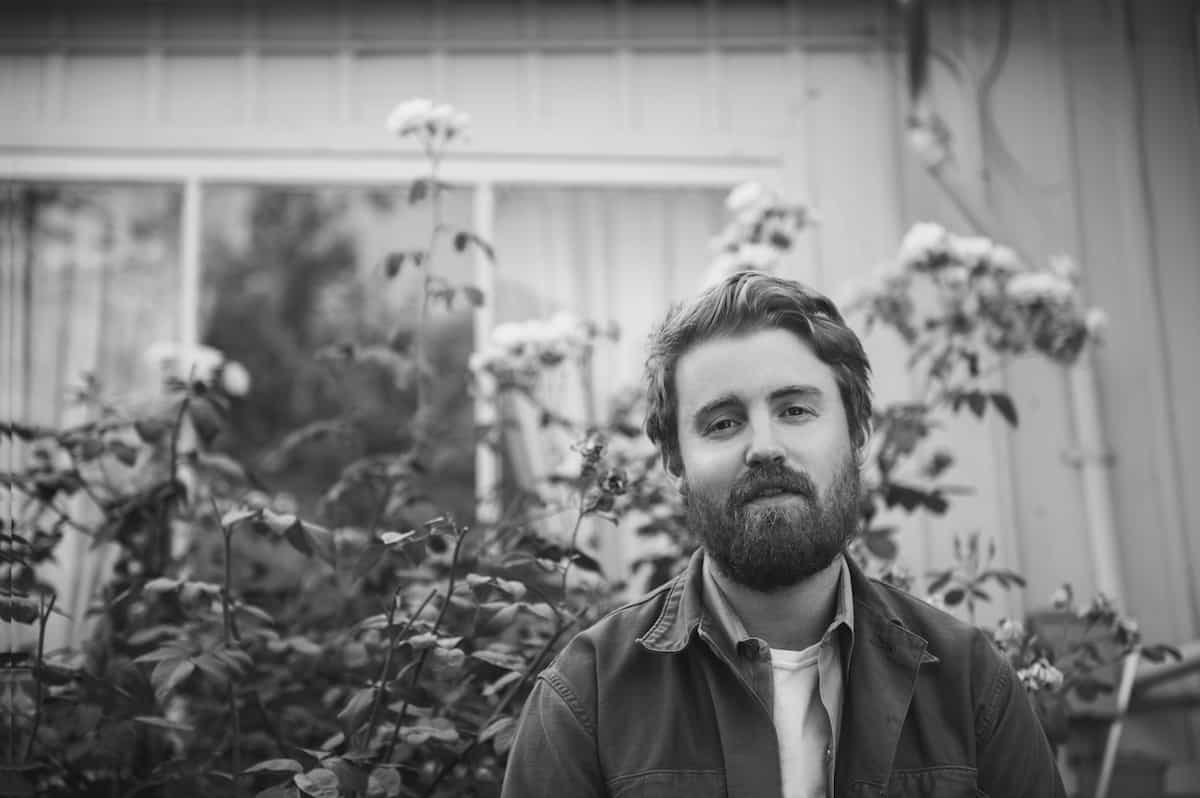
Do you ever find that you have to stop yourself from doing something a certain way?
Gruska: Not necessarily stop myself, but I think I always just have to remind myself of that when it’s not my project. So if there’s a difference in opinion, I’ll obviously always fight for what I believe in, but at the same time there’s a threshold. If you’re talking to an artist that you’re working with and you guys come to a difference in taste or opinion, the artist has to win. Finding a smart way to compromise is the best way, but if it comes down to that, then that’s how it should be. And that’s beautiful, I think, and I actually really love that, because it allows for a much more even sense of diversity in what I do, because I get to sort of assume somebody else’s wishes. Most of the artists that I work with are incredibly willing to experiment and go the extra mile – like Phoebe Bridgers, for example. She’s always down to just try anything. I’m really lucky that I get to work with people that allow for experimentation and to figure out any problem.
En Garde seems to be a lot more collaborative than Slowmotionary, which felt very insular. What led to the decision to invite others into the space of the record? I love the songs with Moses Sumney and Lianne La Havas.
Gruska: Those two songs in particular are probably some of my favorites on the record, too. I do a lot of writing for and with other people, and those two songs actually started as songs potentially for them. When I was starting to put together a list of songs for my record, I had those songs sitting around and thought, “I’ll make a version of them and see if I can make them good, and if they’re great and fit on the record, then I’ll talk to them and see if they want to collaborate or if they’re cool with me using them.” That’s more what the Moses one was like, but with Lianne, we just got together and made that whole thing basically in two days together. I just loved it so much that I wanted to include it, and she was totally cool with that. I think opening up the universe of collaboration on this record was a really huge thing for me. It felt like it was more of a community, and I just felt a lot more love and support during and after. I also feel like having other people’s brains just makes everything better, and it makes me more inspired.
During this whole quarantine thing, my guitarist and I have been sending a Logic file back and forth adding stuff, and even that little thing of sharing that with someone even though you're not in the same room is very helpful for your mental health.
Gruska: Oh, it’s so therapeutic and it’s so comforting, because when you’re alone for long enough, you can convince yourself of anything really, and most of the time when you’re alone working on a record, you can very quickly and easily convince yourself that something is not good or not right. And I think when somebody else comes in, it’s just that confidence boost of like, “Well they’re feelin’ it, and they’re inspired, or they’re making these changes that are making you better.” It’s true, it’s exactly what you said. It makes you feel so much stronger and it takes a village, really.
There’s a lot of variation in the songs on both En Garde and Slowmotionary. What’s your writing process like? What, to you, is a sense of cohesiveness?
Gruska: My writing process is usually always the same, in terms of that I’m usually writing on a guitar or piano, just doing the piano and voice and lyrics. I think cohesiveness for me almost doesn’t really matter that much, because my taste in music and everything is just so varied. I gravitate to things that are sort of all over the place because then I can create my own thread and bounce around. It’s probably just a form of ADD [laughs], and that kind of thing comforts me because my brain is bouncing around so fast. I have a lot of nervous energy, so when things are jumping between calm and eccentric and acoustic and electronics, it just sort of fits with my resting brain function.
I think cohesiveness for me almost doesn’t really matter that much, because my taste in music and everything is just so varied. I gravitate to things that are sort of all over the place, because then I can create my own thread and bounce around.

My music taste is also absolutely everywhere. It's rare and cool to find an album where there's a song that reminds you of Radiohead, and then there's a song that reminds you of Simon and Garfunkel. I much prefer that.
Gruska: Oh, that’s awesome. I definitely was concerned when I was making it sometimes that it was too all over the place. But now, with a little bit of space from it, when I listen back, I think that’s kind of how the world is now. There’s just so much information. It’s all right in front of you. And I think that the record is my small version of that microcosm of everything being right in front of you, and you get to sort of choose your own adventure.
It also lends itself much better to the idea of the album as a unit, rather than the culture of releasing singles and radio play. Because then it has variety, it has peaks and valleys.
Gruska: I totally agree. I think that it makes for a much more involved listening experience for me when a record sounds sort of diverse. I mean, I love putting on a record and listening back to front where there’s a vibe and it’s very clear what the motive is, but I also like the opposite a lot.
I think that it makes for a much more involved listening experience for me when a record sounds sort of diverse.
You use a lot of interesting instrumental timbres in your songs, most notably the muted piano. Can you talk about these choices?
Gruska: Yeah, I use this felt piano quite a bit. I think I like it just because I like warm earth tones, and a lot of it has to do with the high end and being subtle with the upper registers of recording, making sure things aren’t too bright or fatiguing in that area, because I think I’m just attracted to luxurious, velvety sounds. That felt-muted piano was one of the first sounds that I was able to record and just go, wow, that just is so inviting. It’s the sound I think I’ll never get sick of, because it’s a piano, but it just feels much more intimate, and much warmer and much more expressive for me. I think I just gravitate to tones that feel a little bit underwater or under a blanket, that just sort of soothe me.
Without that attack of a piano, it shifts from something like ‘70s Billy Joel to something that sounds a little gentler. Do you know the musician Gabriel Kahane?
Gruska: Yes, I love Gabe! Gabe is a friend of mine.
Because the first song I heard of yours was “The Valley,” and the first thing I thought of was his last album, Book of Travelers, where he used that muted piano the whole time.
Gruska: So he actually used the exact same piano, because he recorded it at my friend Tony Berg’s studio, who produced my first record, and also produced Gabe’s record. He’s actually a huge inspiration to me. So that’s a really good ear because you said, “This sounds really familiar….” and it’s the same instrument, that’s awesome [laughs].
Which of these songs is most meaningful to you and why?
Gruska: I think track one, “Maybe I’ll Go Nowhere,” feels like it came together really well. It’s personal and the lyrics feel true to me and like they’re coming from a real place. I really like “Attacker.” As a song, I feel like that is the most realized as a lyric and as a composition. It surprised me when I was writing it. As I was writing it, I kind of felt like, “I didn’t know that I knew how to talk like this or move around like this on guitar.” I think that when you can surprise yourself, or do something that’s larger than what you think you know how to do, there’s just not a better feeling than that. I also really like “Event Horizon,” because that was a really fun and challenging piece of record-making to do for me. It was so involved and nuanced, and there are so many moving parts to that recording.
Do you feel like there are non-musician writers – prose, poetry, or anything like that – that you find influence you lyrically?
Gruska: Yeah, big time. I love Pablo Neruda. For some reason I’m always really attracted to these South American magical realist writers like Pablo Neruda or Márquez or Borges. I like that kind of writing because it’s simple and understandable, but it’s also really heady at the same time. And it’s very mystical. When I read them, it feels very musical to me, and it inspires me to want to make a weird, twisted up narrative that when you finish it, you understand the feeling that you’re having more than you understand the story. That’s often how I feel with music.
It's so funny you say that, because that was the exact thing I said to my roommate the other day after we watched the Miyazaki movie Spirited Away. I said that the reason I love this movie so much is because there's such an ambiguous feeling that you know on some atomic level, but it's not necessarily an articulable thing.
Gruska: Exactly, that’s a perfect example. I love that. I totally agree with you. It’s unexplainable and that’s the magic of art, and those are the things that I love, where I walk away from a painting or story or a song and I go, “I don’t know what that was, but I know exactly what I’m feeling.”
I’ve been watching a lot of my musician friends have existential crises over the last week or so. What do you want to say to fellow musicians who are going through it right now?
Gruska: Ah, I would just say to support each other. We all need it. Try to stay busy, but also don’t pressure yourself to work right now if you’re not feeling inspired, or if you’re feeling anxious. Just take care of yourself. There’s no time limit on inspiration. Just because you have to stay home right now doesn’t mean that you have to be working. But if you can and if you can push yourself, that’s been the only way that I’ve been able to stay above it.
— —
:: stream/purchase En Garde here ::
— — — —
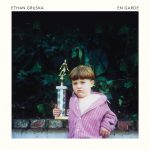
Connect to Ethan Gruska on
Facebook, Twitter, Instagram
Discover new music on Atwood Magazine
? © 2020
:: Stream Ethan Gruska ::



